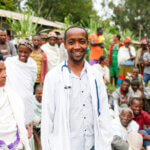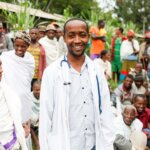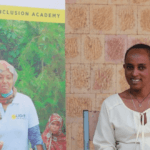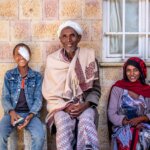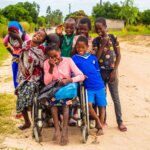- Eye Health
- Disability Rights
When does “healthcare for all” mean just that?
Why disability mainstreaming makes all the difference
Everybody, wherever they may live and whoever they are, should be able to access and afford quality health services. For many people with disabilities this basic right still only exists in theory.
Poverty, by putting needed health care out of reach, can lead to severe health problems and disability. In turn, disability and the barriers people with a disability encounter cause poverty by limiting access to education and work. A truly universal healthcare system, therefore, has to serve a double role with regard to disability:
- Make services accessible to everyone and
- Reduce preventable disability through timely interventions
With 30 years’ worth of experience in providing accessible eye care in low-income countries, Light for the World is happy to share what we learned about the prerequisites of making healthcare truly universal.
Healthcare for the masses, not the classes
One of the major challenges in healthcare provision in low-income countries is that resources aren’t only scarce, but usually also highly centralized. In 2005, of the 5 ophthalmologists working in Mozambique then, all but one offered their services in the capital city of Maputo in the extreme south of the country. Thus, even though health care is nominally universal and free, eye care was available to the economic and political elites, but out of reach to the vast majority of the rural population.
In order to address this problem, a country-wide strategy involving all three levels of eye care provision is needed. Optical Clinical Officers (OCOs) are being trained to man healthcare stations throughout the country, and Light for the World is building a new secondary and tertiary level center, the fully accessible Invicta Eye Clinic, in Beira near the geographical center of the country. There are currently 214 OCOs in Mozambique, up from a mere 19 in 2005. Supported by Light for the World scholarships, five Mozambican post-graduates are currently specializing in ophthalmology. The state has agreed to pay the salaries of resident ophthalmologists in full, making the success of the programme independent of foreign aid.
The first scholarship holder from Mozambique is now taking on a sub-specialization, foreshadowing things to come in the future. The idea is to enable future subspecialists to teach their specializations at Maputo University once a sufficient number of generic ophthalmologists have been trained.
Getting states committed
Mozambique isn’t the only country where we work with our partners to build sustainable eye health systems well embedded in general healthcare. In the Sahel nation of Burkina Faso, Light for the World is recognized as a major player in the areas of eye health, community-based rehabilitation, and disability inclusion. We are therefore in the position to advise the government on disability inclusion and ensure that the needs of people with disabilities are enshrined in health care and education policies.
When healthcare evaporates
The young war-torn nation of South Sudan presents us with an example of what happens when a protracted crisis shakes a society to its core. Over the past few years, our eye care programmes in South Sudan had to shift their focus drastically, from expanding the provision of services to rural regions to maintaining disability-inclusive health care in IDP camps around Juba. In early 2018, the last ophthalmologist left the country, making future medical interventions fully dependent on whether and when external personnel can be shuttled in.
The situation in South Sudan underlines the importance of flexibility: we have to aim as high as humanly possible yet work with the limitations imposed on us by external factors. Any significant extension of health care services requires armed hostilities to cease first. What we can do in the meantime is to ensure that people with disabilities have access to what is available. Healthcare cannot wait!
Every life matters
Meanwhile, Light for the World’s Disability Inclusion Lab is investigating how to make healthcare systems truly accessible to everyone. In Every Life Matters, a three-year programme involving our partner countries of Mozambique, Ethiopia, and Rwanda, we are researching and developing best practices in disability-inclusive health care. A baseline study which involved women and men with disabilities helped us identify the main barriers to getting decent healthcare while also highlighting positive experience. The results will be made available to organizations and states alike.
